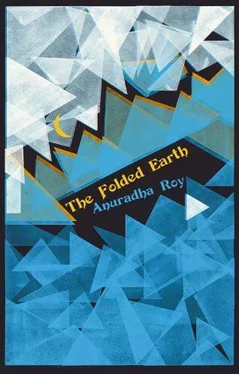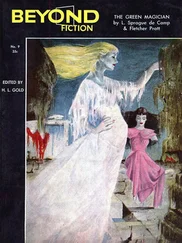“You!” Ama exclaimed. Her thin body shook with mirth. Her long teeth, stained from chewing tobacco, were black and yellow. She noticed my offended look and stopped her laughter. “How are you to look after her?” she said. “You can barely look after yourself, far away from family, all alone.”
I started shuffling the pile of books beside me. I could not tell why my thoughts turned to Miss Wilson’s watch, the round gold one that had belonged to her grandfather, the Collector of Kozhikode. For the first time in sixty-five years, it had stopped working, and she had, with the greatest reluctance, left it for repairs at a watch shop in Haldwani. But last week she had heard the shop had burned to the ground, taking her watch with it. Agnes Wilson had been distraught. Her face had crumpled and her glasses had misted with tears. She could do nothing else but speak of her grandfather: how he had adored her and thought her capable of great things while for the rest of her family she was an unwanted fourth daughter, dark-skinned and ordinary. Her grandfather had dreamed he would see her installed as Collector, or even District Commissioner, and that was what he had whispered on his deathbed, when he handed her that watch. “Not one of his dreams for me came true,” Miss Wilson had said in a broken voice. “And on top of everything, I couldn’t look after his dying gift.” The other teachers had found her grief over an old watch comical. One of them had even done a flawless imitation of her overdone distress. But to my surprise I had felt a pang of sympathy so strong that I had almost reached out to give her hand a squeeze. I had sat with her in silence that afternoon, as if I were on a condolence call, listening to her rambling memories as long as the lunch break allowed. I found my own behaviour mystifying. I had said nothing about it to anyone, not even to Diwan Sahib, knowing he would unleash the full force of his amused sarcasm if I had told him how Miss Wilson’s solitary grief haunted me.
Distracted by my own thoughts, I had not heard a word of what Ama was saying. I scrambled back to our conversation. By now, her tone had turned conciliatory. “You are doing enough for her, Teacher-ni,” she was saying. “But Charu can’t work in that jam factory forever. She has to have a normal life: marriage, children, her own home. I have to marry her off before I die.”
Ama had left without looking at me again, as if conscious she had been tactless. The next day she sent across a bowl of kheer made from the milk of her cows. But I found myself dodging her and turning away from the sceptical look that said it knew everything there was to know. Her presence began to feel intrusive, even overbearing. And then, as if by malicious intent, the post brought me two letters from college friends, both with reports of new babies, thriving families, holidays. “Busy, busy, busy,” said one of them, “I don’t know where the days go. And how are you?”
Charu sensed something was wrong, and wordlessly brought me gifts the whole week: first a white rose made out of crepe paper; followed by a lumpy papier mâché Ganesha that a friend of hers had made; then a vase she had fashioned out of reeds. She cleaned my courtyard with rediscovered concentration. She brought water on her head from a far-off stream when my taps ran dry.
By now five letters had come. I realised I had begun to wait for the postman as expectantly as Charu and it seemed silly for me to keep up the pretence that I did not know who the letters were really from. After the third one came, I said to her in a casual tone, “There’s a letter from Kundan Singh for you.” A look passed between us, I turned to go and fetch the letter, and she knew she was safe. She never mentioned her friend “Sunita” again. She began to interrupt our lessons with unexpected nuggets about Kundan Singh: how he had been with her every night of her vigil when her cow was dying, how they used to meet every afternoon at the Dhobi Ghat, how they had once stolen away and gone to a fair at the Army grounds together and he had bought her a bead necklace. She told me about his parents, his job. It was as if, by talking to me, she was reassuring herself that he was real.
I found myself thinking about them in the middle of my working day, creating sagas out of her stories. In my mind’s eye, I saw her and Kundan haloed in the sunlight of the forest clearing the time I had observed them unseen. From there it took only a minute for me to slide into that afternoon in Hyderabad’s forest reserve when Michael had kissed me and held me against a tamarind tree.
It was not all day-dreaming; I was anxious too about Ama’s reaction. She was venomous without restraint about other transgressors, such as Janaki’s teenaged daughter. “Shameless hussy!” she had spat. “Doesn’t care that everyone knows she’s carrying on with that boy at Liaquat’s medicine shop. He’s not just a different caste, no — he’s a Muslim !” What would she do when she came to know of the secret life her own granddaughter was leading?
I thought back to that fortnight when my father had virtually imprisoned me at home after he spotted me with my arms wrapped around Michael, as we drove past him on the motorbike. I was in the middle of laughing at something, my chin on Michael’s shoulder, my hair streaming behind me in the breeze, when I had noticed my father, limping from the opposite direction, stopping to stare when he noticed us, his head turning to track us as if following a ball at a tennis game where not a stroke could be missed. His eyes had locked into mine as I passed, and for that long moment we were tied together by a thread stretched more taut with each turn of the wheels, which snapped in half when he receded too far into the distance for me to see him any longer. I would never forget the horror on his face that day. Michael’s parents were second-generation Christians, and my father was contemptuous of all Christians — even though he was happy enough to send me to St George’s Grammar School for Girls on the first rung of his grand plan to turn me into an industrial magnate. I had stopped early in life trying to make sense of my father’s paradoxes, as had my mother. He was the natural born lord of all he surveyed, he needed to explain nothing. He ruled over factories and fields and two younger brothers. He spoke little and to the point. He was a short square man, with a bald head that shone in the sun. His bad leg ensured that his silver-headed stick never left his side. It may have been this stick, or his lazy right eye that wandered so that you never knew precisely what he was looking at. They combined to create a subtle suggestion of violence, which nobody wanted to test. By the time I grew up, I was as afraid of him as his brothers were.
The summer nights grew warmer. I could not fall asleep however long I lay in bed, however tight I shut my eyes. I sat for long hours looking at the forest fires outside my window. They happened every summer and they could go on for weeks. When beaten down, they would go underground and travel unseen below the thick matting of pine needles, to spring out in another part of the forest. I could hear a faint crackling. At some distance down the slope, there was a glowing orange line as if someone had flung a long necklace of flames into the forest. Beyond it was another such ring and further away, another still. In the blackness beyond the arc of light from my table lamp, I could see the shadows of soldiers as they raked paths to stop the flames spreading. To the left I could see one of the fire-lines creeping up towards the clerk’s cottage.
As the summer wore on, the air turned heavy with smoke. It gave everyone colds and coughs and Diwan Sahib’s breathing made a sound like rustling leaves. A chir tree near my house had been burning for three days. Flames leaped out from a hollow halfway up its long straight trunk. Its resin oozed down the trunk and made the fire burn more fiercely. There was no water with which to douse it.
Читать дальше












